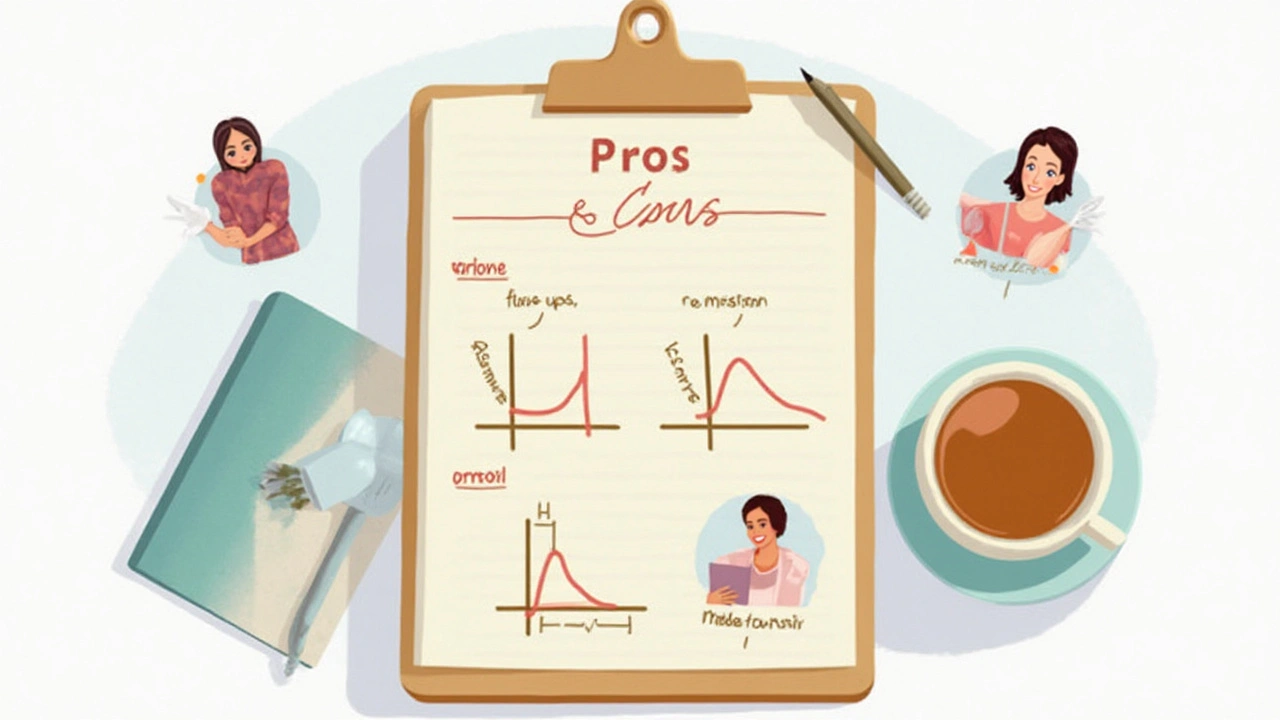Ever feel like the meds for IBD just don't cut it or come with more baggage than they're worth? You're not alone. That’s probably why you’re eyeing something new, like ornidazole. But does it really work for Crohn’s or ulcerative colitis—or is it just another “maybe someday” drug?
Ornidazole isn’t a household name—yet. It's actually been used for years to fight off infections, but now people are asking if it can help calm gut inflammation too. That’s a big deal when you’re dealing with daily stomach pain, unpredictable bathroom trips, and foods that turn traitor in your own body.
If you want to get real about what ornidazole can (and can’t) do for IBD, you’re in the right place. We’ll get into how this medication is supposed to work, what research finds, and what you seriously need to look out for—without drowning you in medical jargon. Ready to get some straight answers? Let’s dig in.
- What Is Ornidazole and How Does It Work?
- How Ornidazole Fits into IBD Treatment
- What Research Actually Says
- Side Effects and What to Watch For
- Smart Tips for Trying Ornidazole
What Is Ornidazole and How Does It Work?
Ornidazole might sound complicated, but it’s actually pretty straightforward. It’s an antibiotic in the nitroimidazole family, a bit like metronidazole if you’ve heard of that one. Doctors have been using it since the 1970s to treat infections caused by bacteria and some parasites, mostly in the gut or reproductive system.
Here’s the cool part: it isn’t just about fighting bugs. When you take ornidazole, it targets the DNA of those bad microbes, messing up their ability to grow and multiply. Without their DNA working right, the bacteria basically can’t survive—so your body gets a break.
But why are people talking about ornidazole for inflammatory bowel disease (IBD)? Crohn’s disease and ulcerative colitis, the two common types of IBD, often trigger inflammation in the gut, and there’s usually some unwanted bacteria taking advantage of the situation. Ornidazole steps in, keeping those microbes in check. Some research suggests it might even help calm down inflammation, not just kill the bugs.
If you compare ornidazole to classic antibiotics, the difference is mostly in how long it can stay active in your body. With a half-life of about 12-15 hours (that’s how long it takes for half the drug to leave your system), you usually don’t need to take it as often as older options. That means fewer missed doses and steadier coverage for your gut.
| Medication | Common Uses | Half-life (hours) |
|---|---|---|
| Ornidazole | IBD, gut and reproductive infections | 12-15 |
| Metronidazole | Gut infections, dental infections | 7-8 |
One last thing: unlike some antibiotics, ornidazole can mix and match with other IBD meds such as steroids or aminosalicylates, which is good news if you’re juggling prescriptions. Still, always let your doctor know exactly what you’re taking so there’s no drama later on.
How Ornidazole Fits into IBD Treatment
When you look at inflammatory bowel disease (IBD), the usual players are steroids, immune suppressants, and sometimes biologics. Ornidazole pops up mostly when doctors want to target bad bacteria in the gut that might be keeping your flares going. If you've heard of metronidazole or ciprofloxacin, ornidazole works along the same lines but with some twists.
Doctors don’t typically use ornidazole as a first-choice drug for Crohn’s or ulcerative colitis. You’ll see it used more when there’s suspicion of infection brewing in the intestines, especially when other antibiotics are causing side effects or just aren’t working well. Some gastro docs try it after surgery for Crohn’s (that’s when gut bacteria can get extra rowdy and cause trouble with healing or strictures).
This drug is sometimes added to help:
- Reduce gut inflammation caused by certain bacteria
- Prevent or treat abscesses near the colon or rectum
- Stop post-surgery complications in Crohn’s patients
- Calm things down during a flare (mainly Crohn’s, sometimes as an experiment with ulcerative colitis)
One study out of Europe showed that giving ornidazole after surgery lowered the chance of Crohn’s disease coming back at the surgery site. They followed people for a year, and those taking ornidazole saw fewer relapses compared to those who didn’t get it. Here’s a quick look:
| Ornidazole Group | Placebo Group |
|---|---|
| 16% relapse at surgery site | 44% relapse at surgery site |
That said, not every doctor is on board yet. Some worry about long-term side effects (more on that in the next section). For now, ornidazole usually comes into play if other antibiotics flop or if you’re in a high-risk period after gut surgery. It’s not a cure-all, but sometimes it’s just the missing piece in the puzzle for people whose IBD won’t calm down with the usual meds.

What Research Actually Says
When you search for answers about ornidazole and inflammatory bowel disease (IBD), you might feel stuck between panicked forum posts and dense medical papers. So, what do real studies actually show?
Ornidazole has mostly been tested in Crohn’s disease, one of the two main forms of IBD. There was a decent-sized trial out of Europe in the early 2000s where scientists wanted to see if it could help keep Crohn’s from coming back after surgery. The main takeaway? Patients who took ornidazole had fewer relapses in the first three months compared to those who took a placebo. That sounds promising, but the benefit dropped off after a year.
Another research group found that some people on ornidazole got side effects, especially with long-term use—think tingling in the hands and feet (doctors call this neuropathy). That’s why most studies don’t recommend staying on it for months on end.
| Study | Main Finding | Side Effects |
|---|---|---|
| Ornidazole after Crohn's Surgery (2003) | Lower relapse at 3 months | 12% neuropathy risk at 12 months |
| Short-Term Use in Ulcerative Colitis | Mixed improvement in symptoms | Some nausea, fatigue |
For ulcerative colitis, the evidence is less solid. Some smaller studies saw slight improvements in symptoms, but nothing groundbreaking. Most doctors still see ornidazole as a backup, not a main event, for this kind of IBD.
Bottom line: ornidazole might help some people with Crohn’s (especially right after surgery), but it’s not a magic pill. Short bursts look safer than long-term use. If your doctor brings it up, ask about your personal risks—especially if you have nerve issues or react weirdly to antibiotics. Always check in if you notice any numbness or burning in your limbs.
Side Effects and What to Watch For
When it comes to trying ornidazole for inflammatory bowel disease, you want the benefits. But what about the downsides? This drug is generally considered safe if you use it short-term, but it definitely comes with quirks that you shouldn’t ignore.
Common side effects that might pop up include:
- Feeling a bit off in your stomach—think nausea, cramps, sometimes diarrhea (which, let’s be honest, is the last thing anyone with IBD wants).
- Metallic taste in your mouth. Seriously, some people can’t drink orange juice without making a face.
- Drowsiness or headache, especially when you first start it.
- Dizziness—don’t plan any mountain biking trips right after your first dose.
Some folks also report tingling hands or feet. That’s called peripheral neuropathy. It’s rare, but if your fingers start to feel weird, hit pause and talk to your doctor.
Serious side effects are uncommon, but worth knowing about. Watch out for symptoms like severe allergic reactions (hives, swelling, trouble breathing), persistent vomiting, or confusion. These need a doctor’s attention—fast.
There’s also research showing that being on ornidazole long-term can increase your risk of liver issues. In a study, about 13% of people on medium-term therapy had noticeably higher liver enzymes. Here’s a quick look:
| Side Effect | Rough Chance (%) |
|---|---|
| Nausea | 10-15 |
| Metallic Taste | 10 |
| Neuropathy | 1-2 |
| Liver Enzyme Increase | Up to 13 |
When you’re using ornidazole in any IBD treatment, regular check-ins with your medical team are key. Blood tests every so often can catch any sneaky liver or nerve issues before they get serious.
One more thing—never mix ornidazole with booze. You’ll risk a rough reaction called disulfiram-like reaction (think vomiting, flushing, pounding headache). Sober dinners are the way to go while you’re on this med.
So, eyes wide open if you’re considering ornidazole for IBD. Ask questions, keep track of changes, and don’t ignore anything that feels off.

Smart Tips for Trying Ornidazole
If you’re considering ornidazole for inflammatory bowel disease, you want to do things right. No one wants to mess up their gut (again). Use these practical pointers to get the best shot at success and avoid headaches down the line.
- Get your doctor on board first. This isn’t a DIY thing—you need the right dose and a doctor to rule out any health clashes, especially if you’re juggling other meds for IBD treatment.
- Stick to the schedule. Ornidazole works best when you take it at the same time daily. Skipping doses? That can tank its effectiveness and may mess with your gut bacteria even more.
- Watch for side effects. Some folks report numbness, tingly fingers, headaches, or funny tastes in their mouths. If any of that pops up, or you feel off, let your doctor know fast.
- Skip the booze. Seriously, mixing alcohol and ornidazole is a bad combo. Your stomach will thank you, and you avoid nasty reactions like nausea or fast heartbeat.
- Be patient with results. Improvements in gut health won’t show up overnight. Most studies looked at folks for at least a month, so give it a fair shot—but keep your doctor posted on any changes, good or bad.
Here’s a quick look at what people most often ask the doc when starting ornidazole for IBD:
| Common Question | What Doctors Usually Say |
|---|---|
| How long do I need to take it? | Usually a few weeks to a couple of months, but it varies. |
| Are the side effects long-lasting? | They usually go away after stopping the drug. |
| Can I take it with other IBD meds? | Often yes, but your doctor should double-check for interactions. |
One more tip: log your symptoms. A simple notebook or a phone app helps you track if ornidazole does anything for your IBD treatment. It’s the easiest way to remember what’s actually working for you and what’s just hype.

Yaseen Muhammad
April 29, 2025 AT 08:35Ornidazole’s mechanism is fascinating-targeting microbial DNA to reduce inflammation is a smart workaround for IBD’s bacterial component. I’ve seen this work in post-op Crohn’s cases in India, especially where metronidazole caused neuropathy. The 12–15 hour half-life makes adherence easier, and unlike some antibiotics, it doesn’t obliterate the microbiome as harshly. Still, liver enzyme monitoring is non-negotiable. Always pair it with baseline and monthly LFTs.
Dylan Kane
April 30, 2025 AT 01:21Wow, another ‘miracle drug’ for IBD? Next they’ll tell us garlic and kombucha cure Crohn’s. This is just metronidazole with a fancy name and a 50% higher price tag. If you’re taking this long-term, you’re basically volunteering for nerve damage. Stop chasing quick fixes and start asking why your gut’s falling apart in the first place.
KC Liu
April 30, 2025 AT 12:52Let’s be real-this isn’t medicine, it’s a controlled pharmaceutical distraction. The ‘study’ cited? Funded by a company that owns the patent. The relapse numbers? Cherry-picked from a 3-month window while ignoring the 12-month neuropathy spike. And why no mention of the FDA’s 2018 warning on nitroimidazoles? Because they don’t want you to know the truth: Big Pharma needs you dependent on drugs that make you numb, not healed.
Shanice Alethia
April 30, 2025 AT 18:16Y’all are acting like this is a harmless little pill. NEUROPATHY. LIVER TOXICITY. ALCOHOL REACTION. This isn’t a ‘maybe try it’ situation-it’s a ‘call your doctor and ask if you’re willing to risk losing feeling in your hands’ situation. I had a friend take this for ‘gut issues’ and now she can’t button her shirts. Don’t be her.
Sam Tyler
April 30, 2025 AT 21:12There’s real value here if approached with caution. Ornidazole isn’t a cure, but for certain patients-especially those with post-surgical Crohn’s and recurrent bacterial overgrowth-it can be a bridge. The key is short-term, monitored use. Pair it with probiotics, avoid alcohol, track symptoms, and get liver enzymes checked every 4 weeks. It’s not about replacing your whole regimen-it’s about fine-tuning it. I’ve seen patients go from 3 flares a year to 1 with this, and no neuropathy. It’s not magic, but it’s not nonsense either. Just do it smart.
shridhar shanbhag
May 1, 2025 AT 01:10In Mumbai, we use ornidazole for amoebic colitis more than IBD-but the mechanism is similar. I’ve had patients with mild UC who couldn’t tolerate sulfasalazine, and ornidazole gave them 6 months of relief. No magic, no hype. Just targeted action. But yes, the metallic taste? Real. And the drowsiness? Don’t drive after the first dose. Also, avoid spicy food while on it-your gut is already stressed.
John Dumproff
May 1, 2025 AT 08:49I just want to say-this post did a great job breaking down a complex topic without making people feel dumb. If you’re reading this and feeling overwhelmed, you’re not alone. Many of us are just trying to find a sliver of relief without losing ourselves to side effects. Ornidazole might not be for everyone, but if your doctor thinks it could help, ask for a trial period, track everything, and remember: your body is telling you things. Listen. You’ve got this.
Lugene Blair
May 1, 2025 AT 17:05THIS. RIGHT HERE. I was skeptical too-until I took it after my ileostomy reversal. Zero relapse for 8 months. Yeah, I had a weird taste and got sleepy, but compared to the pain I was in? Worth it. My doc set me up with weekly check-ins and a liver panel. That’s the secret: structure. Don’t just pop pills and hope. Be the CEO of your own health. You’re not broken-you’re adapting. And sometimes, that means trying something new.
William Cuthbertson
May 1, 2025 AT 19:50There’s a deeper philosophical layer here, isn’t there? We live in an age where we treat inflammation as an enemy to be eradicated-rather than a signal, a conversation our body is having with us. Ornidazole, like all antibiotics, silences the noise, but doesn’t resolve the underlying discord. Is it helpful? Sometimes. Is it sustainable? Rarely. But perhaps its greatest gift is not in curing, but in buying us time-to listen, to change our diets, to confront stress, to rebuild from within. Medicine can be a pause button. But healing? Healing is a practice. And sometimes, a pause is the first step toward a new rhythm.